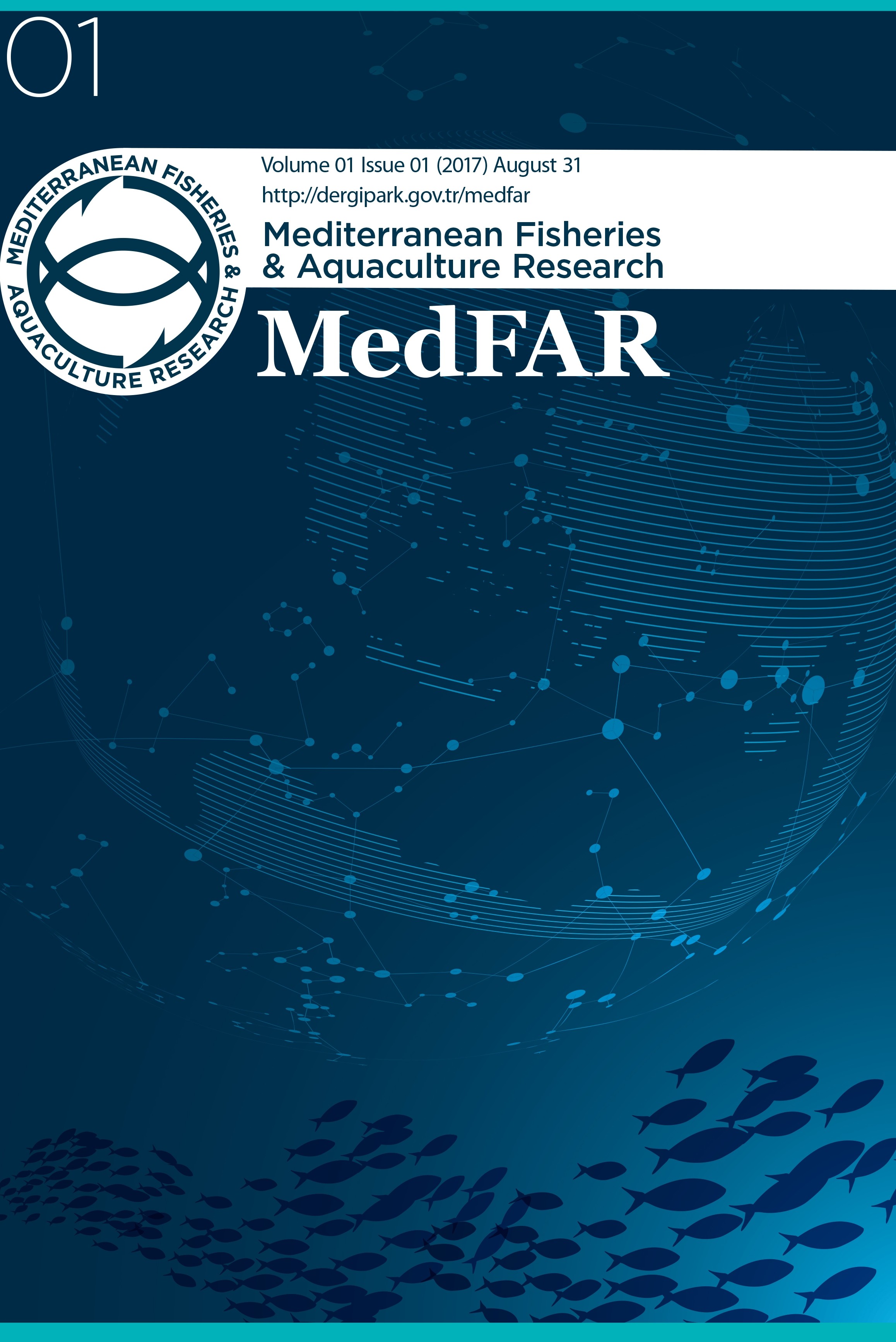Sensory and Chemical Qualities of Marinated African Catfish (Clarias gariepinus, B., 1822) Preserved in Oil and Tomato Sauce
Sensory and Chemical Qualities of Marinated African Catfish (Clarias gariepinus, B., 1822) Preserved in Oil and Tomato Sauce
In this study the sensory criteria and chemical analysis of catfish marinades in tomato sauce and oil was investigated. After the marination process catfish fillets were packed in airproof plastic containers; one being plain (Group A: sun flower oil) and the other being sauced (Group B: sunflower oil and tomato sauce). Then, they were stored in +4 °C for 200 days. During storage, sensory and chemical analyses were carried out. As a result of 200 days of storage, TVB-N analysis results 15.82/16.29 mg/100g, TBA 4.94/4.81 mg MA/kg, the number of peroxide value 3.57/3.40 meq/kg, pH were 4.35/4.36 in sample marinates packaged as plain and sauced respectively. At the end of storage it was determined that African catfish marinates packaged as plain (Group A) and sauced (Group B) can be stored in +4 °C for 200 days and maintained the chemical quality criteria. The shelf life of marinated catfish was found to be 110 days for Group A, 80 days for Group B according to the results of sensory assessments.
Keywords:
Clarias gariepinus, African catfish, marinated fish tomato sauce, quality,
___
- Antonacopoulos, N., Vyncke, W. (1989) Determination of volatile basic nitrogen in fish:a third collaborative study by the West European Fish Technologists Association (WEFTA). Z. Lebensm Unters Forsch 189: 309-316.
- AOAS. (1994) Official methods and recommended practices of the american oil chemists society. American Oil Chemists Society, Champaign, IL.
- Dokuzlu, C. (2000) Shelf-life of the marinated local anchovies. Journal of Faculty of Vertinary Medicine 19: 45-49.
- Duman, M., Emir Çoban, Ö., Özpolat, E., (2015).Effects of rosemary and thyme oils on shelf life of marinated sauce crayfish. The Journal of Animal & Plant Sciences 25(6): 1771-1778.
- Duyar, H.A., Eke, E. (2009) Production and quality determinationof marinade from different fish species. Journal of Animal and Veterinary Advances 8(2): 270-275.
- Dokuzlu, C. (1997) Marinat hamsi üretimi sırasında kullanılan asit-tuz oranlarının ürünün mikrobiyolojik ve organoleptik kalitesi üzerine etkileri ve raf ömrünün belirlenmesi. Pendik Veteriner Mikrobiyoloji Dergisi 28(1): 81-90.
- Erkan, N., Metin, S., Varlik, C., Baygar, T., Özden, Ö., Gün, H., Kalafatoğlu, H. (2000) The effect of modified atmosphere packaging (MAP) on shelf – life of marinated and breaded rainbow trout. Turkish Journal of Veterinary and Animal Sciences 24: 585-591.
- Karl, H., Roepstorf, A., Huss, H.H., Bloemsma, B. (1995):Survival of anisakis larvae in marinated herring fillets. International Journal of Food Science& Technology 29: 661-670.
- Kaya, G.K., Gözü, B.B., Baştürk, Ö. (2010) The investigation of quality changes in marinades obtained from frozen african catfish (Clarias gariepinus, B., 1822). Journal of Animal and Veterinary Advances, 9(23): 2982-2985.
- Kilinç, B., Çakli, Ş. (2004) Marination technology. Ege University Turkish Fisheries 21: 153-156.
- Kilinç, B., Çakli, Ş. (2005) Determination of the shelf life of sardina (Sardina pilchardus) marinades in tomato sauce stored at 4 ºC. Food Control 16: 639-644.
- Ludorff, W., Meyer, V. (1973) Fish and fisher products. Hamburg- Berlin: Paul PareyVerlag.
- Kolodziejska, I., Niecikowska, C., Januszewska, E., Sikorski, Z.E. (2002).The microbial and sensory quality of Mackerel hot smoked in Mild Conditions. Lebensmittel-Wissenschaft und-Technologie 35: 87–92.
- Mattissek, R., Shengel, F.M., Steiner, G. (1988) Lebensmittel-Analytick. Berlin: Springer Verlag.
- Mclay, B.R. (1972) Marinades. Torry Advisory Note No: 56. Ministry of agriculture, fisheries and food, Torry Research Station. Aberdeen.
- Özden, Ö., Baygar, T. (2003) The effect of different packaging methods on some quality criteria of marinated fish. Turkish Journal of Veterinary and Animal Sciences 27: 899-906.
- Özoğul, Y., Balıkçı, E., (2013). Effect of Various Processing Methods on Quality of Mackerel (Scomber scombrus). Food and Bioprocess Technology 6(4): 1091–1098
- Poligne, I., Collignan, A. (2000) Quick marination of anchovies (Engraulis enchrasicolus) using acetic and gluconic asids, ouality and stability of the end product. Food Science and Technology 33: 202-209.
- Sallam , Kh.I., Ahmed, A.M., Elgazzar, M.M., Eldaly, E.A. (2007) Chemical quality and sensory attributes of marinated Pacific saury (Cololabis saira) during vacuum packaged storage at 4 °C. Food Chemistry 102: 1061-1070.
- Schormuller, J. (1968) Handbook of food chemistry (Band III/2). Berlin-Heidelberg-New York: Springer-Verlag.
- Suvanich, V., Marshal, D.L. (1998) Influence of storage time and temperature on quality of catfish (Ictalurus punctatus) frames. Journal of Aquatic Food Product Technology, 7(1): 61-76.
- Tarladgis, B.G., Watts, B.M., Younathan, M.S., Dugan, L. (1960) Distilationmethod for the quantitative determination of malonaldehyde in rancid foods. Journal American Oil Chemical Society 37: 44-48.
- Taşkaya, L., Alparslan, Y., Hasanhocaoğlu Yapıcı, H., Metin, C., Baygar, T., (2016) Determination of shelf life of Gibel Carp (Carassius gibelio, Bloch 1782) marinades in different sauces stored at 4 ºC. Ege Journal of Fisheries and Aquatic Sciences 33(1): 55-61.
- Varlik, C., Uğur, M., Gökoğlu, N., Gün, H. (1993) Principles and methods of quality control in seafood. İstanbul: Food Technology Association.
- Varlik, C., Erkan, N., Metin, S., Baygar, T., Özden, Ö. (2000) Determination of the shelf-life of marinated fish balls. Turkish Journal of Veterinary and Animal Sciences 24: 593-597.
- Varlik, C., Erkan, N., Özden, Ö., Mol, S., Baygar, T. (2004) Seafood processing technology. İstanbul: İstanbul University.
- Yapar, A. (1998) Some quality changes in anchovy (Engraulis encrasicolus) marinades produced by using two different ripening solutions. Ege University Turkish Fisheries 15: 1–7.
- Başlangıç: 2018
- Yayıncı: Mersin Üniversitesi
Sayıdaki Diğer Makaleler
An Overview of the Seafood Processing Sector in Some Mediterranean Countries
Climate Change And European Aquatic Resources-Ceres Project
Gülderen KURT KAYA, Özden BAŞTÜRK
The Sea in the Middle of Lands
Büket Buşra DAĞTEKİN, Gulsum BALCIK MISIR, Sebahattin KUTLU
Will The New Large-Scale Aquaculture Projects Make Egypt Self Sufficient In Fish Supplies?
